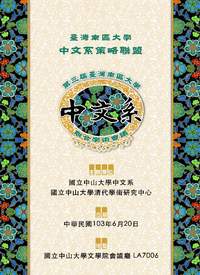港臺(tái)國學(xué)類學(xué)術(shù)會(huì)議信息(四十一)
8、第三屆臺(tái)灣南區(qū)大學(xué)中文系聯(lián)合學(xué)術(shù)會(huì)議
時(shí) 間:2014年6月20日(周五)
地 點(diǎn):中山大學(xué)文學(xué)院7樓文LA7006(高雄市鼓山區(qū)蓮海路70號)
主辦單位:中山大學(xué)中文系、清代學(xué)術(shù)研究中心
連結(jié)網(wǎng)址:http://www.chinese.nsysu.edu.tw/app/news.php?Sn=799
內(nèi)容簡介:
專題演講:二重奏--紅學(xué)與清史的對話/黃一農(nóng)
論文題目暨發(fā)表人:
古籍整理示例——以《全清詞》佚收查升詞為例/王偉勇
《春秋》書法與「義」在言外——屬辭比事與舍傳求經(jīng)三法門/張高評
范仲淹〈岳陽樓記〉對越南使節(jié)岳陽樓詩文的影響/陳益源
莊子的自然美學(xué)與氣氛倫理——與本雅明、伯梅的跨文化對話/賴錫三
《無量壽經(jīng)》會(huì)集本的爭議及布教效益/陳劍锽
《莊子?齊物論》「吾喪我」探析/簡光明
〈宋辯才法師年譜〉商議/黃惠菁
王維折腰七律新探/王頌梅
論羅門都市詩中的死亡觀照/曾進(jìn)豐
對五種青銅酒器名稱的學(xué)術(shù)史回顧與討論/鄭憲仁
從「九伐之法」到「稱君,君無道也」——論《春秋》的「書法」變革/宋惠如
五四?性別?現(xiàn)代性:魯迅與馮沅君小說返鄉(xiāng)書寫之比較/楊雅琄
陶侃傳說探究/羅景文
9、2014「全球視野下的中國近代史研究」國際學(xué)術(shù)研討會(huì)
時(shí) 間:2014年8月11至13日(周一至周三)
地 點(diǎn):中央研究院 (臺(tái)北市南港區(qū)研究院路二段128號)
主辦單位:中央研究院近代史研究所、二十世紀(jì)中國史學(xué)會(huì)(HSTCC)
聯(lián) 絡(luò) 人:林秀娟,Tel: 886-2-27898202;schuan@gate.sinica.edu.tw
連結(jié)網(wǎng)址:http://www.mh.sinica.edu.tw/PGStudyGroup_Page.aspx?studyGroupID=14
內(nèi)容簡介:
會(huì)議時(shí)間:2014.8.11-13
會(huì)議地點(diǎn):中央研究院(臺(tái)灣臺(tái)北市)
使用語言:中文或英文
摘要繳交日期:已截止
論文繳交截止日:2014.7.10
本研討會(huì)已公布論文評選結(jié)果:
【群組論文】
國家、族群與認(rèn)同︰穆斯林在現(xiàn)代中國的發(fā)展與適應(yīng)(張中復(fù)、吳啟訥、平山光將)
近代中國的科學(xué)與技術(shù)知識的轉(zhuǎn)變與其文化意義(朱瑪瓏、葉爾建、王憲群、嚴(yán)曉佩)
游觀與時(shí)局:近代中國城市指南的編輯與傳播(孫安石、吉澤誠一郎、呂紹理、林美莉)
趨俗還是入圣?--清末民國時(shí)期上海城市空間的轉(zhuǎn)型(孫慧敏、吳政哲、康豹)
Senses in Chinese Science during the Twentieth Century(Fa-ti Fan、Jia-Chen Fu、Grace Shen、Chen-Pang Yeang)
The Co-production of Science and Modern China(Eugenia Lean、Micah Muscolino、Sean Hsiang-lin Lei、Arunabh Ghosh)
中日交流場域中的新媒體、新平臺(tái)與新文化實(shí)踐(戰(zhàn)曉梅、劉建輝、潘光哲、賴毓芝)
思想、制度與實(shí)踐:近代中日文化、經(jīng)濟(jì)往來互動(dòng)的多重面向(王晴佳、陳力衛(wèi)、陳繼東、黃自進(jìn)、陳慈玉、李宇平)
探索硝煙之外的世界:近代中日戰(zhàn)爭的再思考(朱浤源、孫江、鹿錫俊、楊典錕)
內(nèi)外相涉的交錯(cuò)空間:近代中日的政治與外交(趙軍、姜克實(shí)、劉杰、王新生、林滿紅)
城市指南與城市休旅文化的塑造及變遷(馬樹華、潘淑華、巫仁恕、張瑾)
城市指南與北京市民生活(劉小萌、羅文華、賴惠敏)
戰(zhàn)爭時(shí)期日本對外的調(diào)查:中國「占領(lǐng)地」.「滿洲」.臺(tái)灣(林志宏、吉田建一郎、佐藤仁史、林文凱)
【個(gè)人單篇】
侍從室與戰(zhàn)時(shí)國民政府的情報(bào)工作(1933-1945)(張瑞德)
“Turning to face the shore”: Buddhist responses to suicide during the Republican period(柯必德(Peter J. Carroll))
The Pitfalls of Transnational Distinction: Globalizing the Chinese Honor System in the Early Twentieth Century(Elisabeth Kaske)
The Representation of China’s Natural Heritage: Nationalism, Tourism and Picturesque Landscape(Pedith Chan)
1946-47年我國接收與進(jìn)駐南海四沙群島過程及其意義(湯熙勇)
Los Colonos Asiaticos: Revisiting the International Coolie Trade between China and Latin America in the Nineteenth Century(Rudolph Ng)
Republic of Martyrs: The War Dead and the Making of Modern China, 1911-1949(Linh Vu)
從《女界鐘》到整型風(fēng)--“追求美麗”的變形金剛(鮑家麟)
疫苗等免疫技術(shù)在中國的發(fā)展--以日本轄下滿州等地為例(沈佳姍)
When Contract Labor Became“Feudal”: Converging Notions of Work, Employment Relations, and Citizenship in Republican China(Limin Teh)
全球氣候變動(dòng)與民國十八年陜西大年饉(張萍)
被動(dòng)之戰(zhàn)的動(dòng)員:日俄戰(zhàn)爭和巴黎和會(huì)時(shí)期中國國族想象構(gòu)建之比較(王超華)
Popular Perspectives on Judicial Torture in Qing China(Nancy Park)
彭真對「文革」前中共首都北京市的政治治理:理念、人事和影響(1956-1966)(鍾延麟)
From Disaster to Laughter: Making Comedies in the Changing Politics of the People’s Republic of China, 1959-1963(王卓異)
The Creation and Definition of Artistic Value in Communist China(Vivian Li)
民國初期北京女劇的發(fā)展--以志德社為中心(吳宛怡)
「科學(xué)史學(xué)」與現(xiàn)代中國史學(xué)專業(yè)精神的形塑(1917-1937)(胡成)
香港混血華人家族的中國認(rèn)同——以何東、何世禮為例(李盈慧)
Blooming, Contending and Staying Silent: Student Activism and Campus Politics in China, 1957(Yidi, Wu)
Western-educated Chinese Christian Returnees and the Chinese Societies: 1900-present(Yuqin HUANG)
臨危受命:抗戰(zhàn)前期陳光甫與美國桐油借款(何光誠)
亟待救贖:晚清潮州女傳教士筆下之中國婦女(聶利)
Save China, Save Peace’: The China Branch of the Rassemblement universel pour la Paix and the Localization of an International Movement during the War of Resistance, 1938-1940(任可)
Education as a Continuation of Revolution: the Communist Education of Petty Urbanites in 1927-1937 Shanghai(Miao Feng)
10、2014臺(tái)灣文化學(xué)術(shù)研討會(huì)
時(shí) 間:2014年8月16至17日(周六至周日)
地 點(diǎn):臺(tái)南大學(xué)(臺(tái)南市中西區(qū)樹林街二段33號)
主辦單位:國立臺(tái)南大學(xué)臺(tái)灣文化研究所
聯(lián) 絡(luò) 人:李小姐,Tel: 06-2133111#751;E-mail: polaris@mail.nutn.edu.tw
連結(jié)網(wǎng)址:http://web.nutn.edu.tw/gac750/index.htm
內(nèi)容簡介:
一、緣起:
臺(tái)灣文化的研究雖然范圍包羅萬象,但卻是最貼近臺(tái)灣這塊土地與人民生活一個(gè)重要區(qū)塊,舉凡臺(tái)灣庶民的信仰及儀式行為如祖先崇拜、神靈信仰、歲時(shí)祭儀、時(shí)間觀念、空間觀念、符咒法事以及鎮(zhèn)煞厭勝等;文化生活中的禮俗如婚喪喜慶中所尊奉的傳統(tǒng)儀式,乃至入厝、遷居等生活細(xì)節(jié)觀念;族群關(guān)系與互動(dòng)往來、地區(qū)開發(fā)過程與聚落形成、傳統(tǒng)藝術(shù)等都涵納其中,使得臺(tái)灣文化擁有歷史、地理、文化、族群、宗教、信俗等多元化與跨領(lǐng)域議題研討的意涵與最佳條件,透過「2014臺(tái)灣文化學(xué)術(shù)研討會(huì)」,讓各方學(xué)者與民間文史與文化工作者得以齊聚一堂,共同探討臺(tái)灣的歷史發(fā)展、文化內(nèi)涵、社會(huì)現(xiàn)象、地理環(huán)境、宗教信仰、傳統(tǒng)藝術(shù)等跨領(lǐng)域的多元議題,不但可分享彼此研究成果,更可激發(fā)本土情懷與本土認(rèn)同感,重視在地的歷史文化與文化資源。誠摯邀請您踴躍賜稿。
二、征稿主題:
(一)臺(tái)灣歷史、地理、族群、文化、思潮等議題。
(二)臺(tái)灣宗教信仰、歷史建筑、傳統(tǒng)藝術(shù)等議題。
(三)臺(tái)灣聚落發(fā)展、產(chǎn)業(yè)研究、多元文化等議題。
三、時(shí)程:
1.全文征稿截止日期:2014年6月30日(周一)止
2.研討會(huì)舉辦日期:2014年8月16日(周六)、17日(周日)
四、征稿格式:
1.字?jǐn)?shù):以3萬字為上限。
2.附中文摘要(以不超過500字為限)、關(guān)鍵詞2至5個(gè)。
3.其余照學(xué)術(shù)論文規(guī)格。
五、繳交稿件:
1.基本數(shù)據(jù)表及書面稿:請以郵寄方式寄至
70005臺(tái)南市中西區(qū)樹林街二段33號「國立臺(tái)南大學(xué)臺(tái)灣文化研究所」收
請注明「投稿2014臺(tái)灣文化學(xué)術(shù)研討會(huì)」。
2.電子文件:請務(wù)必以e-mail方式傳送至polaris@mail.nutn.edu.tw。
六、審查方式:由本所專兼任教師及聘請校內(nèi)外相關(guān)領(lǐng)域?qū)<覍W(xué)者擔(dān)任審查工作。
七、文責(zé)版權(quán):論文請勿一稿兩投,經(jīng)本所錄用之論文,請授權(quán)本所發(fā)行。
※歡迎踴躍投稿,如有任何問題請洽詢國立臺(tái)南大學(xué)臺(tái)灣文化研究所李小姐。
電話:06-2133111分機(jī)751
傳真:06-3017136
e-mail:polaris@mail.nutn.edu.tw
地址:70005臺(tái)南市中西區(qū)樹林街二段33號
11、第八屆臺(tái)灣總督府檔案學(xué)術(shù)研討會(huì)
時(shí) 間:2014年8月28至29日(周四至周五)
地 點(diǎn):國史館臺(tái)灣文獻(xiàn)館(南投市中興新村光明一路254號)
主辦單位:國史館臺(tái)灣文獻(xiàn)館
聯(lián) 絡(luò) 人:張麗玲,Tel: 049-2316881#321
連結(jié)網(wǎng)址:http://www.th.gov.tw/epaper/view2.php?ID=119&AID=1687
內(nèi)容簡介:
國史館臺(tái)灣文獻(xiàn)館館將于2014年8月28~29日舉辦「第八屆臺(tái)灣總督府檔案學(xué)術(shù)研討會(huì)」,凡與「臺(tái)灣總督府檔案」產(chǎn)業(yè)經(jīng)濟(jì)、法制、宗教、教育、社會(huì)、人物及其它等相關(guān)議題之研究。
◎本研討會(huì)已公布公開征稿結(jié)果
日治初期臺(tái)灣中部的隘制(邱正略)
日治時(shí)期臺(tái)灣總督府的芳油技術(shù)研究與資源利用(高淑媛)
日治時(shí)期的法院高等官通譯:譯者身份的形成及其群體角色(楊承淑)
臺(tái)灣殖民時(shí)期「公共住宅」經(jīng)營與空間變遷(1908~1945)(沈孟穎、傅朝卿)
臺(tái)灣総督府の阿片専売政策——臺(tái)灣における罌粟栽培について(栗原純)
日治初期的地方官僚與臺(tái)灣統(tǒng)治——以橋口文藏為例(黃美惠)
日治初期臺(tái)灣金融秩序新建之再考——以臺(tái)灣銀行為中心(李為楨)
◎稿件字?jǐn)?shù)與審查:論文題目、大綱及摘要(600~1?500字),請于截止日前(含)投稿。一經(jīng)入選者,另通知撰文并于研討會(huì)時(shí)酌發(fā)出席費(fèi)。日后匯整出版論文集時(shí),經(jīng)審查通過者再依照字?jǐn)?shù)核算稿費(fèi),每千字新臺(tái)幣700元計(jì)(字?jǐn)?shù)最高以2萬字為限)。
◎連絡(luò)方式:
1.電子郵件寄送
schau@mail.th.gov.tw或clill@mail.th.gov.tw
2.電話:049-2316881轉(zhuǎn)305(蕭碧珍編纂)或321(張麗玲小姐)
12、2014「跨越民族脈絡(luò)的政治哲學(xué):中文語境中的施密特與斯特勞斯政治思想」學(xué)術(shù)研討會(huì)
時(shí) 間:2014年9月1至2日(周一至周二)
地 點(diǎn):中央研究院 (臺(tái)北市南港區(qū)研究院路二段128號)
主辦單位:中央研究院人文社會(huì)科學(xué)研究中心
聯(lián) 絡(luò) 人:吳添成,Email: politics@ssp.sinica.edu.tw
連結(jié)網(wǎng)址:http://www.rchss.sinica.edu.tw/news/news.php?Sn=1119
內(nèi)容簡介:
Call for Papers
International Conference on “Political Philosophies across the National Context: Carl Schmitt and Leo Strauss in the Sinophone World”
Center for Political Thought, Research Center for Humanities and Social Sciences, Academia Sinica, Taipei, Taiwan
Date: September 1-2, 2014
At least to Western observers, it must come as a surprise that Carl Schmitt and Leo Strauss are at the center of intellectual debate in contemporary Chinese societies. In the earlier stage of democratization in Taiwan, Schmitt’s idea of “constituent power” was also important for the constitutional theories exploring the transition from authoritarian constitutionalism to a democratic one. In recent years, the writings of Schmitt and Strauss have become the object of intense debate among Chinese intellectuals. Quite a few of them attempt to re-think issues like liberalism, democracy, globalization and international law by the means of Schmittian and Straussian concepts. Some even think that the legacy of Leo Strauss might help Chinese scholars to reformulate the original questions at the heart of their own tradition of thought.
The International Conference “Political Philosophies across the National Context: Carl Schmitt and Leo Strauss in the Sinophone World” aims at investigating the reception of Schmitt and Strauss in the Chinese cultural context. It is rather obvious that the Chinese interest in Schmitt and Strauss echoes the widespread disillusionment of Chinese intellectuals with earlier attempts to introduce Western liberal ideas into China. Thus, the reception of Schmitt and Strauss in China might be nothing but an ideological stance which reflects the particular situation of contemporary China. At the same time, however, it can be argued that the interest in Schmitt and Strauss represents an attempt to overcome the confines of Communist ideology by rediscovering the intellectual resources of Chinese civilization. In this sense, the analysis of this particular intellectual constellation promises to provide us with important insights into the intellectual landscape of post-communist China. Furthermore, we have reason to believe that the Chinese interest in Schmitt and Strauss also has an important trans-cultural dimension which needs to be investigated on a more theoretical level. For example, what mode of political philosophy can be established when Schmitt and Strauss encounter the Chinese intellectual tradition? What exactly is the meaning of Schmitt’s and Strauss’ critique of liberal democracy in a non-Western environment? If it is true that the process of globalization should be seen not as diminishing, but rather as intensifying conflict between cultures and political communities, what are the consequences for political philosophy? Although both Schmitt and Strauss are the products of the crisis of Weimar, might it be the case that certain ideas and issues with which Schmitt and Strauss were struggling resonate with the history of Chinese thought? And, finally, what does all this mean for the political future of China, Taiwan, East-Asia, and the world?
These are some of the questions which we hope to discuss during our conference. The conference welcomes contributions from the scholars all over the world, and will be conducted in English.
If you are interested in participating in the conference, please fill the attached form or send the title and abstract of your paper as well as your CV via Email to: Mr. Tien-Cheng Wu (politics@ssp.sinica.edu.tw; fbiwu@gate.sinica.edu.tw) before February 15, 2014. The Center for Political Thought will contact you if your proposal can be integrated into the agenda of the conference. For those papers which deal with the Schmitt-Strauss legacies with the Taiwanese political theory will be considered with priority.
13、臺(tái)灣人類學(xué)與民族學(xué)學(xué)會(huì)2014年會(huì):當(dāng)代人類(學(xué))處境
時(shí) 間:2014年10月3至4日(周五至周六)
地 點(diǎn):國立政治大學(xué)(臺(tái)北市文山區(qū)指南路2段64號)
主辦單位:臺(tái)灣人類學(xué)與民族學(xué)學(xué)會(huì)
聯(lián) 絡(luò) 人:Tel: (02)2652-3449;E-mail: tafea@gate.sinica.edu.tw
連結(jié)網(wǎng)址:http://www.taiwananthro.org.tw/news/1315
內(nèi)容簡介:
回顧近六年來臺(tái)灣人類學(xué)與民族學(xué)學(xué)會(huì)年會(huì)的主題,從2008年〈人類學(xué)的挑戰(zhàn)與跨越〉、2009年〈艱困時(shí)局下的人類學(xué)〉、2010年〈人類學(xué)視界@臺(tái)灣〉、2011年〈民族、民主、民生:人類學(xué)的場域〉、2012年〈區(qū)域研究@臺(tái)灣人類學(xué)〉、到去年(2013年)〈田野就在你身邊〉,可以看出國內(nèi)人類學(xué)的關(guān)注情境,除了檢視自身學(xué)科本質(zhì)和研究取向的專業(yè)性外,人類學(xué)者的現(xiàn)世關(guān)懷及其實(shí)踐亦是重要的趨勢之一。這種對于現(xiàn)世關(guān)懷的投入與反思,也反映在人類學(xué)與人類社會(huì)之間各種處境中所展現(xiàn)的互動(dòng)性與復(fù)雜性,以及跨學(xué)科視野下的多樣性。今年年會(huì)主題為〈當(dāng)代人類(學(xué))處境〉,而不是一般性的〈當(dāng)代人類學(xué)處境〉,即是希望以更為寬闊多變的視野,將「從當(dāng)代人類學(xué)處境看人類」、與「從當(dāng)代人類看人類學(xué)處境」這兩種研究面向,展開有意義的對話。這其中對于處境的理解不僅是順境或困境,而是透過處境的多樣面貌與不同的觀察投入,將人類學(xué)的現(xiàn)世關(guān)懷得以尋繹出具有實(shí)踐意涵的切入點(diǎn),這其中也可以就以下四個(gè)方向來進(jìn)行思索與探討︰
一、人類(學(xué))/非人類(學(xué))
二、當(dāng)代 /非當(dāng)代
三、處境 /跨境
四、分流 /匯流
為持續(xù)去年年會(huì)擴(kuò)大參與的成效,本次年會(huì)亦誠摯邀請碩、博士研究生及近年獲得學(xué)位的新科碩、博士,和與會(huì)者分享各自開發(fā)之新創(chuàng)主題與相關(guān)議題。除大會(huì)主題外,其它主題的panel或個(gè)別論文,也歡迎投稿。有關(guān)籌組panel、在線投稿流程、專題活動(dòng)規(guī)劃、與WCAA互動(dòng)交流等事宜,屆時(shí)年會(huì)籌委會(huì)亦會(huì)于學(xué)會(huì)網(wǎng)頁公告并與各位同仁保持密切聯(lián)系。
14、「以物觀物:臺(tái)灣、東亞與世界的互文脈絡(luò)」國際研討會(huì)
時(shí) 間:2014年10月17至18日(周五至周六)
地 點(diǎn):待定
主辦單位:國立中山大學(xué)人文研究中心及文學(xué)院
聯(lián) 絡(luò) 人:E-mail: chsc705@mail.nsysu.edu.tw
連結(jié)網(wǎng)址:http://la.nsysu.edu.tw/m/404-1006-91285-1.php
內(nèi)容簡介:
人類文明的歷史有精神與物質(zhì)兩大范疇;兩者相互影響,在各民族、各時(shí)代產(chǎn)生不同的生活樣貌。而正由于如此,人們的文化記憶乃可深烙于物質(zhì)之中。
一地的物質(zhì),自有其本土生成的風(fēng)物,也有源于外來異文化的傳播。這些「物」既具有其獨(dú)特的社會(huì)生命周期,也呈現(xiàn)出文化差異的敘事空間。物與物之間,更環(huán)環(huán)相扣成多元的「互文脈絡(luò)」,編織成一重層意義的「象征之網(wǎng)」。以臺(tái)灣為例,自原住民初始,及今各個(gè)時(shí)期,或殖民,或移民,可說是經(jīng)過了多元文化的墾殖洗禮,也創(chuàng)造了流動(dòng)視域下的物質(zhì)網(wǎng)絡(luò)。——透過物質(zhì)觀照物質(zhì)——由臺(tái)灣出發(fā),我們的視域更可擴(kuò)及東亞,以至于世界……。
以往的物質(zhì)研究常從人類學(xué)考古的角度出發(fā),考掘古代的器物以了解時(shí)代的變遷;但近年來的物質(zhì)文化研究,則不僅探討生存條件,還以語言學(xué)、歷史學(xué)、文學(xué)、美學(xué)與文化研究等方法,去觀照各個(gè)時(shí)代、各種環(huán)境中與生活相關(guān)的事物,進(jìn)而分析其價(jià)值觀、審美觀,以至于社會(huì)整體的脈動(dòng)。
因此本會(huì)議企圖探討人文現(xiàn)象中「物」之諸課題,思辯物質(zhì)文化的社會(huì)性、現(xiàn)代性和全球性等多重向度;希望涵括人文學(xué)科中歷史、哲學(xué)、文學(xué)、藝術(shù)、語言各范圍,經(jīng)由物質(zhì)文本,結(jié)合地緣批評與歷史記憶,重新思索臺(tái)灣、東亞與世界的互文脈絡(luò)。
會(huì)議子題涵括以下各面向:
1.風(fēng)土中的形象、聲音與意義
2.日常生活的微物敘事
3.情以物遷:生命書寫與物質(zhì)文化
4.言與物:語言使用的實(shí)證軌跡
5.記憶、疆界與物質(zhì)文化
6.族群遷徙、物質(zhì)流動(dòng)與文化翻譯
7.神與物游:東/西方「物—我」思維比較
8.其它
本研討會(huì)摘要審查結(jié)果已于三月底完成,且已以電郵個(gè)別通知投稿人。近日有投稿者詢問,恐是電子郵件有所遺漏,請未收到通知信函者與主辦單位聯(lián)絡(luò)。會(huì)議議程將于近日公告。



